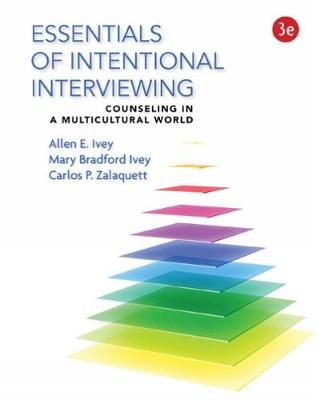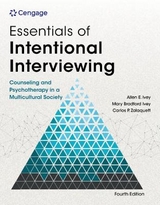
Essentials of Intentional Interviewing
Brooks/Cole (Verlag)
978-1-305-08733-0 (ISBN)
- Titel erscheint in neuer Auflage
- Artikel merken
An excellent guide to interviewing in the helping professions, ESSENTIALS OF INTENTIONAL INTERVIEWING, 3rd Edition, presents the authors' renowned microskills model, which revolutionized modern understanding of the counseling and therapy process by teaching vital interviewing skills step-by-step. This demystifying process breaks down counseling into manageable micro units and builds a bridge between theoretical understanding, mastery of the skills, and the practice of counseling. The book's multicultural focus reflects the diverse nature of today's classroom-and society. New to this edition are a chapter on crisis counseling, basic information on neuroscience as it relates to interviewing, new video content, and brief summaries of key theories of helping (with additional information and transcripts available online). In addition, MindTap-an online learning platform with a full array of text-specific study tools-is available with the new edition.
Allen E. Ivey is a distinguished university professor emeritus at the University of Massachusetts, Amherst. A diplomat in counseling psychology, he has presented workshops and keynote lectures with Dr. Mary Bradford Ivey throughout the world. Dr. Ivey is a fellow of the American Psychological Association, the American Counseling Association and the Asian-American Psychological Association. His work in diversity led him to be honored as a multicultural elder at the National Multicultural Conference and Summit. He has written more than forty books and two hundred articles and chapters, and his writing has been translated into twenty languages. Dr. Ivey's undergraduate work was in psychology at Stanford University, which was followed by a Fulbright grant to study social work at the University of Copenhagen in Denmark. His doctorate is from Harvard University. At Colorado State University, he led the first research study video in counseling and therapy, and he is the originator of the microskills approach, foundational to this text. He was first to introduce applied neuroscience and neurobiology to the helping fields. He is the recipient of numerous national and international awards. Carlos P. Zalaquett, Ph.D., is a professor in the Department of Educational Psychology, Counseling and Special Education and coordinates a team of counseling outcome researchers from around the country. He is a former president of the Interamerican Society of Psychology/Sociedad Interamericana de Psicología (SIP) and former president of the Florida Mental Health Counseling Association, the Suncoast Mental Health Counselors Association (SMHCA) and the Florida Behavioral Health Alliance. He currently serves as president of the Pennsylvania Mental Health Counselors Association (PAMHCA). He is also a former faculty and assistant director of research in the Department of Psychology in the Pontificia Universidad Católica de Chile. Dr. Zalaquett is a registered psychologist in Chile and a licensed mental health counselor in the state of Florida. Dr. Zalaquett is an internationally recognized expert on mental health, counseling, psychotherapy, diversity and education, and he has conducted workshops and lectures in eleven countries. He is the author or co-author of more than seventy scholarly publications and five books, including the Spanish version of Basic Attending Skills. He has received many awards, such as the USF Latinos Association's Faculty of the Year, the Tampa Hispanic Heritage's Man of Education Award, the SMHCA Emeritus Award, and the Award for Internationalization of the VIII Congreso Regional de la Sociedad Interamericana de Psicología (CR-SIP) 2022. His current research focuses on therapeutic outcome. Furthermore, he also uses a neuroscience-based framework to compare brain activity and self-reported decision making. This cutting-edge research integrates mind, brain and body in the exploration of human responses central to counseling and psychotherapy. Mary Bradford Ivey, Ed.D., is a former vice president of Microtraining Associates. She has served as visiting professor at the University of Massachusetts Amherst, the University of Hawai'i at Manoa, and Flinders University in South Australia. She is a retired elementary counselor and a former stress management counselor at Amherst College. Her comprehensive elementary program was named one of the top ten in the nation at the Christa McAuliffe Conference. Dr. Ivey earned her Master of Arts in counseling from the University of Wisconsin and her Doctor of Education in organizational development at the University of Massachusetts Amherst. She is the author or co-author of twenty books (translated into multiple languages) as well as several articles and chapters. A Nationally Certified Counselor (NCC), she has presented workshops and keynote lectures with Dr. Allen Ivey throughout the world. She is also known for her work in promoting and explaining development guidance and counseling in the United States and abroad. She is one of the first fifteen honored fellows of the American Counseling Association and is also a recipient of the American Counseling Association's Ohana Award for her work in multicultural counseling.
Section I: OVERVIEW AND COMPETENCIES OF CULTURALLY SENSITIVE LISTENING.
1. Introduction: Foundations of Interviewing and Counseling.
2. Multicultural Competence, Ethics, Positive Psychology, and Resilience.
3. Attending, Empathy, and Observation Skills: Fundamentals of All Interviewing and Counseling Approaches.
Section II: THE BASIC LISTENING SEQUENCE AND ORGANIZING AN EFFECTIVE INTERVIEW.
4. Questions: Opening Communication.
5. Encouraging, Paraphrasing, and Summarizing: Active Listening and Cognition.
6. Observing and Reflecting Feelings: The Heart of Empathic Understanding.
7. How to Conduct a Five-Stage Counseling Session Using Only Listening Skills.
Section III: HELPING CLIENTS GENERATE NEW STORIES THAT LEAD TO ACTION: INFLUENCING SKILLS AND STRATEGIES.
8. Focusing the Interview: Exploring the Story from Multiple Perspectives.
9. Empathic Confrontation: Supporting While Addressing Client Conflict.
10. Reflection of Meaning and Interpretation/Reframing: Restorying Client Lives Through Meaning Making.
11. Empathic Self-Disclosure and Feedback: Relationship, Immediacy, and Genuineness.
12. Directives: Providing Information, Psychoeducation, and Decisional Counseling's Natural and Logical Consequences-Helping Clients Move to Action.
Section IV: SKILL INTEGRATION, CRISIS COUNSELING, AND DEVELOPING YOUR OWN STYLE.
13. Skill Integration Through Examining Your Own Session, Treatment Plans, and Case Management.
14. Crisis Counseling and Assessing Suicide Potential.
15. Determining Personal Style in a World of Multiple Theories.
Appendix I: The Ivey Taxonomy: Definitions of the Microskills Hierarchy and Predicted Results from Using Skills.
Appendix II: The Family Genogram.
Appendix III: Counseling, Neuroscience, and Microskills.
Glossary.
| Verlagsort | CA |
|---|---|
| Sprache | englisch |
| Maße | 203 x 253 mm |
| Gewicht | 640 g |
| Themenwelt | Medizin / Pharmazie ► Medizinische Fachgebiete ► Psychiatrie / Psychotherapie |
| Sozialwissenschaften ► Pädagogik ► Bildungstheorie | |
| Sozialwissenschaften ► Soziologie | |
| Technik ► Maschinenbau | |
| ISBN-10 | 1-305-08733-X / 130508733X |
| ISBN-13 | 978-1-305-08733-0 / 9781305087330 |
| Zustand | Neuware |
| Haben Sie eine Frage zum Produkt? |
aus dem Bereich



